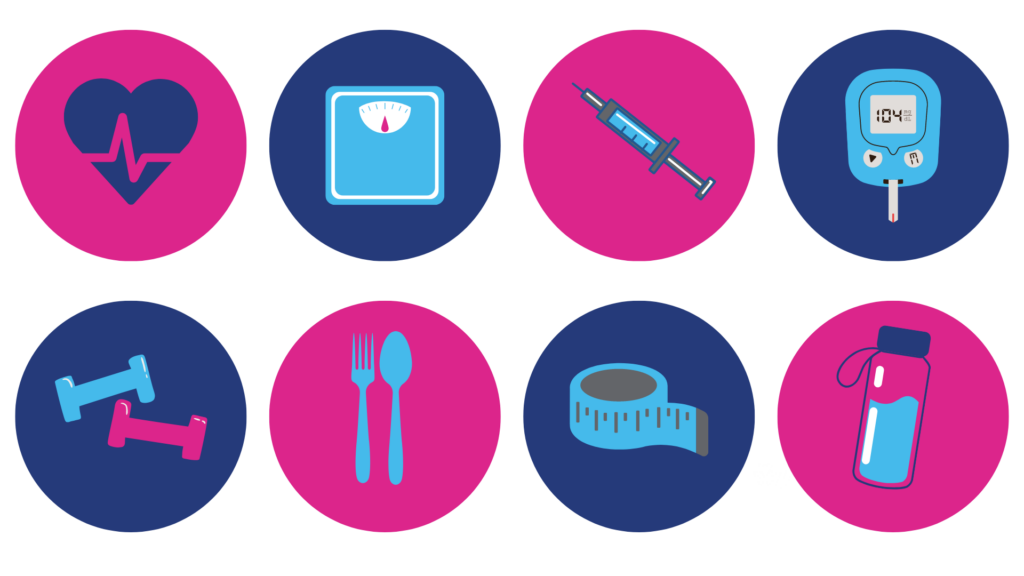This blog was reviewed by Avita Care Solutions Chief Medical Officer Dr. Chris Hall, MD
New frontiers in weight management
In recent years, there have been exciting developments in the field of obesity medicine and weight management. A new class of injectable medications approved for obesity has provided a new treatment option for those struggling with weight gain and its related health effects.
These medications have been life-changing for many with obesity when used in combination with nutritional counseling, physical activity, and behavioral support techniques. Pharmaceutical companies and clinics often provide these tools through a range of new digital apps and other options.
AvitaCare Atlanta’s Alene Albritton, MPH, RD, CDES, is a Dietitian who assists Atlanta patients who have diabetes as well as a host of other nutritional concerns. She has some good advice on how new approaches can supplement traditional weight loss strategies, some of which involves weight loss drugs. Read on to learn more.
Weight loss drugs…all the rage?
Medications like Wegovy and Ozempic have grown in popularity as they’ve become more widely prescribed and discussed on social media by those touting their benefits and dramatic results. 15% of Americans have used Ozempic for weight loss, while 47% know someone who has.
While both Wegovy and Ozempic contain the same generic medication, Semaglutide, only Wegovy is FDA (Food and Drug Administration) approved for those with obesity. On the other hand, regulatory authorities have approved Ozempic solely for the treatment of type 2 diabetes.
But first: how weight management improves well-being and self-image
Weight management can have a significant positive impact on overall health and well-being in multiple ways. Medical professionals recognize that maintaining a healthy weight reduces the risk of various chronic health conditions, such as type 2 diabetes, heart disease, high blood pressure, and certain types of cancer.
Obesity is associated with over 200 different medical conditions and by focusing on weight management, many of these illnesses can improve or resolve completely. For patients with obesity, weight loss may also lead to higher energy levels, improved mobility, and better sexual health.
Feeling more comfortable and confident in one’s body can contribute to reduced anxiety and depression. Improved physical appearance and confidence can positively affect social interactions. People may feel more comfortable engaging in social activities, making connections, and for some, having a more fulfilling sex life.
Semaglutide? What’s that?
Semaglutide, marketed under brand names like Wegovy and Ozempic, functions as a medication to manage obesity and type 2 diabetes. The drugs work by stimulating a naturally occurring digestive hormone called GLP-1. This leads to reduced appetite, increased feelings of fullness, improved blood sugar control, slowed down digestion, and decreased cravings.
Semaglutide acts like a pretend version of GLP-1, so it trains our body to do good things to manage blood sugar. This can not only help control blood sugar levels, but it might also help with losing weight. People with type 2 diabetes can take semaglutide by giving themselves a shot once a week. It’s an important part of their diabetes treatment plan.
Risks and benefits
The benefits of these drugs include improved blood sugar control, potential weight loss, and reduced risk of cardiovascular events. However, as with any medication, there are also potential risks and side effects. The most common side effects that people experience are nausea or gastrointestinal issues, but this tends to improve over time and with dietary or dosage adjustments. More rarely patients can develop gallstones, dehydration leading to kidney dysfunction or pancreatitis and there’s some data that they may lead to an increased risk of certain thyroid tumors. It’s important for patients to discuss these benefits and risks with their AvitaCare Atlanta clinician or other healthcare provider to make an informed decision about use.
Dr. Ryan Macht, a bariatric surgeon and obesity medicine specialist at Avita Care Solutions and a Q Care Plus Clinician, says “Patients are most successful when taking these medications as a part of a comprehensive obesity treatment plan monitored by a clinician experienced in Obesity Medicine. These medications can show significant effectiveness for patients with obesity, but individuals without an FDA-approved indication should avoid their use due to the potential for side effects.”
Do I have to have diabetes to use Wegovy or Ozempic?
Wegovy got the green light from the FDA in 2021, while Ozempic was given the go-ahead for use in type 2 diabetes back in 2017. But here’s the interesting part: Wegovy is specifically designed for people who have obesity, which means they have a body mass index (BMI) greater than 30. It’s also for folks who are overweight, with a BMI greater than 27, as long as they have at least one problem related to their weight, like high blood pressure or high cholesterol. (By the way, BMI is a number that helps measure whether a person’s weight is healthy for their height. More on that below!)
When it comes to using Wegovy, the doses are a bit higher compared to Ozempic. However, because of these higher doses, it’s really important for a healthcare provider to keep a close eye on you. This helps to make sure that any potential side effects are minimized and properly treated. That’s where our team at AvitaCare Atlanta comes in: we can monitor your overall weight management or diabetes plan to help you stay on track, reach your goals, and stay safe while doing so!
What is “BMI”?
BMI stands for Body Mass Index. It’s a tool that helps you figure out if your weight is healthy for your height. It’s a bit like a ratio that helps us understand if we’re too heavy or too light for how tall we are. But here’s the thing: BMI only looks at weight and height. It doesn’t consider how much muscle we have, how our bones are built, where our fat is stored, or what our whole body is made of. So, sometimes it might not tell the whole story.
So, while BMI is useful, it’s not the full picture. We should also pay attention to things like how big our waist is, what our body is made of (like muscles and bones), and how healthy we are overall. Dieticians, like Alene Albritton at AvitaCare Atlanta, can help paint the whole picture of health for each individual.
With all this in mind, BMI is calculated by dividing a person’s weight in kilograms by the square of their height in meters (kg/m²). “Normal” is defined as BMI of 18.5 – 24.9, “overweight” as 25 – 29.9, and “obesity” as 30 or over.
I’ve heard these drugs are expensive
Like many new pharmaceuticals, the cost of these drugs can be high. On average, the retail price of these medications ranges from $1,000 to $1,200 or more for one month. Though, the price may depend on the pharmacy you use.
For folks who have type 2 diabetes and are prescribed Ozempic, there might be a silver lining if you have insurance. Depending on your insurance coverage, Ozempic might be included in your plan, which could help make it more affordable.
Now, for people who aren’t dealing with diabetes but are looking to use these medications to help with weight issues, a healthcare provider needs to get involved. They’ll take a close look at your BMI and see if you have other health problems related to your weight. This careful assessment helps determine if these medications are the right fit for you.
So, while these drugs can be on the pricey side, there might be options to help with the cost. If you have insurance and are managing diabetes, there could be coverage available. For those without diabetes who are overweight, it’s important to work with a healthcare provider to see if these medications are the right step and to explore options that could make them more affordable.
What if the drug isn’t covered or I lack insurance? What can I do?
Your provider will need to secure authorization for insurance coverage, and not all requests achieve success. In some cases, it’s just a matter of submitting additional clinical information, but some insurances may require the use of an alternative medication first or don’t provide coverage for any weight management medications at all. Your provider and pharmacist can assist you in comprehending what will be necessary. Some without insurance coverage have decided to pay cash for the medication – but the cost is high, and this is not a solution for most of us.
According to Alene, though, even if people can afford the drug out-of-pocket, they may want to consider alternative or combination weight-control options. “The long-term fix for weight management is different for everyone,” says Alene.
One of the biggest barriers to long-term weight management is making consistent behavioral changes, according to Alene. “Making positive decisions for your health is not always easy. A lot of patients go from not thinking about food at all to thinking about it every day. Especially when they are trying to reach their health goals. They’ve never had to create a plan before, but that’s where we come in to help,” says Alene. There is no one-size-fits-all solution. “People are so different. The thing with food, like weight management, is finding balance. Make small changes over time and they will build. Portion sizes are important when considering your diet, as well as increasing your intake of plant-based foods. I can help people work through that part of it and come up with an individualized plan that helps them meet their goals,” says Alene.
What about the supply of the drug, I’ve heard the supply is low?
Supply of these drugs ebbs and flows, with occasional backorders. Unfortunately, this shortage is disproportionately impacting those in the southern region of the country. Miami and Atlanta are the two top cities for online searches for the drug than any other (per 100,000 residents).
Avita Care Atlanta has worked hard to make sure the drug is available to clinic partners whose patients need it.
How do I find out more? AvitaCare Atlanta can help!
Despite some of the current challenges with cost and potential shortages of Ozempic and Wegovy, 58% of medical practitioners say they would recommend Semaglutide for weight loss. A visit with Alene Albritton and the rest of the team can help answer questions.
AvitaCare clinicians can assess your clinical indications, discuss risks, and benefits, and devise a plan for you that includes one of these drugs in combination with supportive changes in your diet, activity level, or newer weight loss modalities. If prescribed one of these drugs, Avita Pharmacy staff can get you medication. They can also counsel you on dosing, and proper administration, and ensure you get the refills you need.




